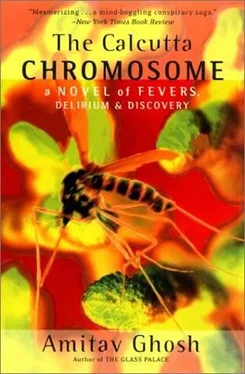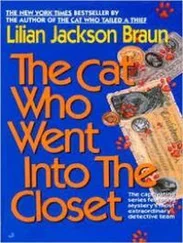'What else?' said Urmila.
There was a brief pause, and then in an undertone, Murugan said: 'Syphilis.'
Urmila flinched, making an involuntary shrinking movement. Murugan turned on her, eyes narrowed. 'You don't have to worry,' he said. 'It's not contagious: I was officially cured a long time ago.'
'I'm sorry…' Urmila could not trust herself to say any more.
Murugan kept his eyes on the shops, food-stalls and travel agencies that flanked the road. With his face averted, he said: 'I guess it started somewhere over there.' He made a vague gesture at the skyline. 'On Free School Street. I was fifteen: I'd been to see a film at the Globe, after school. I was walking past New Market, on my way home, when a guy came up to me and whispered in my ear. I guessed he was a pimp: I'd been reading a lot of American detective novels. I was in my ink-stained school pants and a sweaty end-of-the-day shirt, with my textbooks and class notes slung over my shoulder. He was wearing a green checked lungi, and he had a thin pencil moustache and tiny bloodshot eyes. He winked before he whispered in my ear and gave me this toothy little grin. I could smell the paan and stale liquor on his breath. It was irresistible. All I had was five rupees but that was enough. He led me down one of those tiny alleys around Free School Street, just around the corner from the Armenian school, where William Thackeray was born. We went up a dark, stinking staircase that looked like it led to the anus of the earth. But then we got to the top and suddenly there was this great sunburst of light and noise and voices and music: it was like walking into a fairground – a huge room, with little curtained cubicles all around it, and vendors selling paan and tea, and all these women sitting on chairs lined up against the wall, with flowers around their wrists. I never looked back; I was hooked. I loved them; I loved everything about them, even the way they laughed behind my back when I was running down the stairs, afterwards, my pants half-unbuttoned.'
He fell silent, smiling to himself.
'And then,' he said, 'the lesions began to appear: scabs and sores and loosening teeth. I changed the way I dressed; I wore a lot of clothes, more and more, even on those June days when the heat is like a jackhammer waiting to hit you in the face. I managed to hide the scabs for, oh, I don't know how long, for months anyway – even though it hurt by then, God, it hurt. And when it was finally caught there was no disguising it. That was why my family had to leave the city: the shame.'
'But syphilis is curable now, isn't it?' Urmila said. 'With antibiotics?'
'Sure,' said Murugan. 'I got cured. They can cure it now – except for what it does to your head.'
IT WAS THE RAIN, blowing in through the flapping shutters, that roused Sonali. Her eyes were gummy and swollen; she had trouble prying her eyelids open. She was lying on her side, staring at a ribbon of dust that had gathered along the edge of a wooden floor.
She had no idea where she was, the wall could have been any wall, anywhere; she did not know how long she had been there or what she was doing on the floor. Her first instinct was to go rigid, to keep absolutely still, lizardlike, to make herself invisible.
Lying motionless on the floor, she began to listen, concentrating her mind on her hearing. Slowly she began to pick up the sound of cars, on a road nearby; a Vividh-Bharati jingle on a transistor radio; bicycle bells, a backfiring engine, all the usual street noises, but somewhere in the distance. But here in her immediate vicinity, there were no sounds at all; she could hear nothing – nothing that gave her any clues about where she was or whether there was anyone else in the room.
And then she heard something, not so far away as the sounds of the street: a metallic creak, the sound of an unoiled hinge, of a heavy gate swinging slowly open. A moment later she heard footsteps, crunching on gravel: they seemed to be getting closer, coming towards her.
She turned over, slowly, and discovered that she was lying on the floor of a narrow wooden gallery. Pushing herself up she inched to the edge and looked over.
She found herself looking down upon an enormous empty room. A fading, twilight glow was shining through a broken skylight. She spotted a small pile of ashes and halfburnt twigs at the far end of the cavernous room. Now it started to come flooding back: the staircase, the noise, the smoke, the crowd of people, gathered around a body. With a gasp she leaned over again, looking all around her: there was no sign of anyone; the room was empty.
The footsteps were inside the house now; they were downstairs, probably somewhere near the staircase. Sonali drew her head quickly back, and lay still, her breath pumping torpidly in and out of her lungs.
They were climbing up the rotten staircase; she could hear their shoes on the steel scaffolding. She heard the sound of a voice – a man's voice, somewhere outside. Then there was a woman's voice too; still muffled, although their footsteps were somewhere beneath her, very close to the reception room.
She heard the feet entering, pacing back and forth. Then all she could hear was the sound of the blood pounding in her ears. She closed her eyes, biting her lip, trying to summon the courage to look down.
'There's no one here,' a voice said. It was a woman speaking – someone familiar, someone she knew.
She raised her head, very slowly, and inched forward, to the edge. Then a cry burst from her lips: 'Urmila!'
'Sonali-di!' Urmila gasped, spinning around. Simultaneously Murugan shouted: 'She's up there, come on.' Sonali allowed her head to sink to the floor, in relief.
Then they were up beside her, in the gallery, helping her down the ladder, holding her hands, and she was crying, fighting for her breath, and between her sobs she heard herself trying to speak, struggling to say something coherent, but the words came out all wrong, all mixed up, in a meaningless jumble.
'Calm down Sonali-di,' Urmila said. 'It's all right; we're here now. Tell me: why are you here? When did you come?'
Sonali tightened her grip on Urmila's hand.
'I came late last night,' she said. 'I came to look for Romen; somehow I knew he would be here.'
'Did you find him?' Urmila asked.
Sonali began to sob again.
'That's the strange part, Urmila,' she said, 'I don't know.' Sonali began to tell them about the taxi to Robinson Street, climbing the stairs, the smoke, the people, finding the gallery, the boy, the woman in the sari, the fire, the body…
'And then she put out her hands,' said Sonali, 'and touched the body that was lying in front of the fire and called him Laakhan. Just before I passed out I managed to see who it was.'
She choked.
'Who was it?' said Urmila.
'It was Romen.' Sonali began to sob.
'And the woman,' Murugan broke in, 'who was she? Did you know her?'
Sonali shook her head, from side to side, wiping her tear. streaked face on her blouse.
'I'm not sure,' she said. 'She looked so familiar, but I couldn't remember.'
Then Urmila took her hand, elbowing Murugan out of the way. 'Try, Sonali-di,' she said. 'Try and remember. Who was it?'
Sonali's eyes widened as she looked into Urmila's face. 'It was someone you know, Urmila,' she said. 'I'm sure of that: that's why she seemed familiar – someone I've heard you talk about, someone I haven't seen in years.'
Suddenly, Urmila rocked back on her heels, dropping Sonali's hand. 'No,' she whimpered, her hands flying to her mouth. 'No, not Mrs… '
'Yes,' said Sonali. 'That's who it was – Mrs Aratounian.'
ANTAR WOKE UP to find his bedclothes drenched in sweat and his throat burning. He stumbled to the door, and looked down the corridor: the kitchen seemed to slide away from him, receding into the distance. He felt his knees weakening and had to lean against the wall to keep himself upright. He turned his head to look at the palm of his hand, and saw that it was trembling, shimmering against the flat whiteness of the wall. In rising panic he clapped his hands against his cheeks, his chest, his sides, only to discover that he was shaking all over.
Читать дальше












